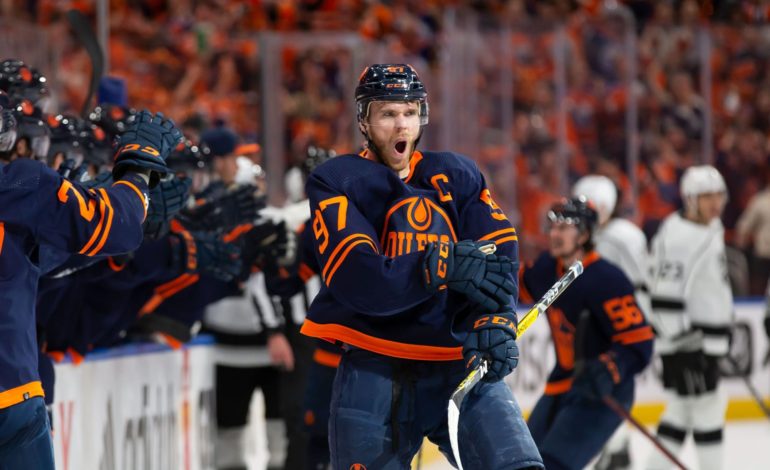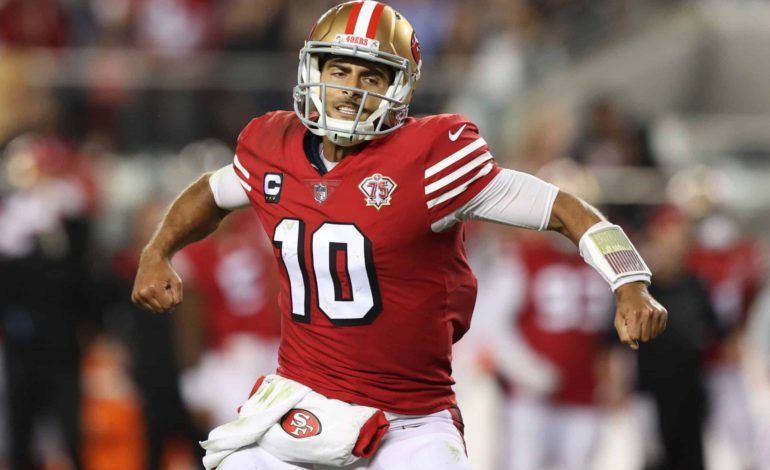On Thursday, the NBA officially retired Bill Russell’s jersey number 6 across the entire NBA. The move came less than two weeks after Russell passed away at his home in Mercer Island, WA. Russell famously won 11 championships in 13 seasons with the Boston Celtics, including two titles where he served the franchise as a player-coach. Russell also won an Olympic Gold medal and two NCAA titles as an amateur and went 10-0 in NBA Game 7’s. He doesn’t have any Finals MVP awards, because they didn’t exist yet. But they did name the trophy after him.
Russell is one of, if not the, most heralded champion in American team sports. Winning 11 championships read like a fairy-tale. Coaching simultaneously is akin to a Disney movie.
But the NBA retired Bill Russell’s number 6. They didn’t make some “too good to be true” movie about it. So why retire 6?
Why Retire 6?

But Bill Russell’s number isn’t just being retired because he is a great champion. The NBA won’t retire the number 23 because of Michael Jordan’s legacy on the floor. Wilt Chamberlain didn’t get the number 13 retired across the NBA by scoring 100 points. Russell’s number 6 is being retired because of his impact on the world, with basketball as his catalyst. Russell was the first Black coach of an integrated team in North American sports history.
In 1959, Bill Russell became the first active NBA player to visit Africa, where he conducted basketball clinics with the U.S. State Department in Libya, Ethiopia, Guinea, and Liberia. While there, he invested heavily in an African-owned and operated rubber plantation that operates today. In 1963, he’d run a similar -integrated- basketball camp in Jackson, Mississippi, and received death threats.
Even though he was an NBA All-Star, Russell was prohibited entry from hotels and restaurants in segregated cities across the United States because he was Black. This came to a head in 1961, when he and his Black teammates refused to play in an exhibition game in Lexington, Kentucky, after being refused service at a restaurant that seated their white teammates. In 1963, when Martin Luther King Jr. gave his I Have a Dream speech, Russell was in the front row. Years later, at the 1967 Cleveland Summit, Russell stood tall with other Black athletes of the 1960s in support of Muhammad Ali’s decision to refuse service to the Armed Forces.
Russell was blunt. When asked about why other teams didn’t start five Black players, like his Celtics, he assumed there must be “unspoken quotas,” because teams were too worried about how their fans felt watching “too many” Black players. That comment alone may have cost him another NBA MVP in 1964, a season in which he averaged 15 points and 24.7 rebounds per game for the number one seeded, 59-21 Boston Celtics. But he wasn’t going to shy away from how he felt. Consistently, throughout his career, Russell put the fight for equality ahead of his career on the floor.
(For what it’s worth: Russell won the MVP in 1963 and 1965. And in ’64? His Celtics drummed NBA MVP Oscar Robertson‘s Royals 4-1 in the first round of the playoffs.)
In his memoir, Second Wind: The Memoirs of an Opinionated Man, Russell details gutwrenching stories of prejudice, racism, and bigotry he and his family faced throughout his life. Stories about being young and old, from his life, his father’s life, and his grandfather’s life. He details life on both coasts, the deep south, and traveling throughout the midwest. If one thing is evident in Russell’s memoir, it’s that racism is violent, in every corner of this country, and does not care how many championships you win. While Russell was on the road, playing at an unprecedented and unrepeated championship level for the Celtics, his Bostonian home was broken into. His trophies smashed. There was someone’s feces in his bed.
Russell’s voice carried well beyond his playing days. Jackie Robinson’s family asked him to be a pallbearer at Robinson’s funeral in 1972. More recently, Russell praised Kaepernick for kneeling to take a stand. Kaepernick pointed to Russell as an inspiration.
Russell’s impact is visible in sports today. Russell fought to be an activist and athlete at a time when his job, and life, were in danger for doing so. Today? Entire leagues offer PSAs for diversity. The NFL will paint “End Racism” in end zones in an effort to push the message Bill Russell championed. The NBA put Black Lives Matter across the shared floor in “the bubble” during the COVID-19 pandemic. During said bubble, the Milwaukee Bucks began a wildcat strike and shut the NBA down in response to another shooting of a Black person by police.
Russell received the Presidential Medal of Freedom in 2011. 6 years later he posed kneeling, in honor of Kaepernick, with the medal around his neck in 2017. 6.
Proud to take a knee, and to stand tall against social injustice." #takeaknee #medaloffreedom #NFL #BillRussell #MSNBC pic.twitter.com/1MhinoAcW7
— TheBillRussell (@RealBillRussell) September 25, 2017
Honoring Russell This Year
The NBA will retire the No. 6 league-wide honoring the late, legendary player and activist Bill Russell.
— Shams Charania (@ShamsCharania) August 11, 2022
In his honor, the NBA has declared the number 6 will be retired across all 30 franchises. Magic Johnson had this idea on August 2nd just after Russell had passed, but it wasn’t new. When Major League Baseball retired 42 across the entire league, in honor of Jackie Robinson, many felt Russell was, in a similar vein, the natural choice for basketball.
Bill Russell was not the first Black player in the NBA. Chuck Cooper, Nat Clifton, and Earl Loyd broke that barrier in 1951, 6 years before Russell entered the NBA. 6.
Russell was the first “must watch” player in NBA history. The historic Boston Celtics defense was built on funneling players to Russell. Their blur of a fast break was predicated on his rebounding and passing. Russell was not the first Black player in the NBA, but he was far and away the first Black superstar in the NBA. Bill Russell made the Celtics they hadn’t been with Hall of Famers Bob Cousy, Ed Macauley, Bill Sharman, and Arnie Risen. He made them champions. Immediately. 11 times. And he never apologized, bent, or changed who he was once.
Russell will also be represented in a jersey patch this season on every NBA jersey, and a similar design and recognition will also go on the floor in all 29 NBA arenas this year.
As for players who wore number 6 last season, they will reportedly be “grandfathered in.” So LeBron James, K.J. Martin, Montrezl Harrell, and others will be allowed to wear it until they retire.
Unless a young, current number 6 goes on to have a surprising turn towards the Hall of Fame, there won’t be many sixes retired. Boston already had it in the rafters for Bill Russell. Philadelphia retired it to honor Julius Erving, San Antonio raised a banner for Avery Johnson, and Phoenix retired it for Walter Davis. It’s safe to assume that Miami retires number 6 in honor of LeBron James’ time there. James won a title in Los Angeles wearing 23, but has worked his way up several all-time lists wearing 6. How he’s remembered in the Crypto.com arena is up in the air.
Now Russell’s 6 will hang in every arena.
But Why Now?

In 1972, Bill Russell initially refused to attend his own jersey retirement. Per his memoir, Second Wind, Russell did not want to celebrate with the city. Russell and the organization opted to have a closed ceremony, with just his teammates, coaches, and the management, instead. They conned him into showing up early, before he worked as a commentator. The stadium seats were empty, roughly 20 Celtics stood on the floor.
Now, in his absence, the entire NBA landscape will forever celebrate Bill Russell. His number 6 will hang with all of the retired numbers for each of the 30 franchises throughout the NBA because his impact spread wider than the NBA himself.
Much like his ceremony in Boston, he won’t celebrate this with fans. Russell won’t see the world celebrate him the same way the world missed his first jersey retirement, just inverted. All of the current celebrations of Russell are happening posthumously. The ever-present stories of his strength are history shared by his fans and idolizers.
I don’t know what the reaction from an average NBA fan would have been in 1969, the year Russell retired, but I don’t think that the idea of retiring Russell’s number league-wide would have gone over very well. His praise is current. The past was turbulent, as is the case for any number of athletes who strive to make a difference. Ali carried the torch at the 1996 Olympics, but 30 years earlier? He was stripped of his boxing license and titles for refusing to fight in Vietnam. The aforementioned Jackie Robinson received a similar honor from the MLB to the one the NBA is bestowing on Russell. But while he played? Robinson had to wear protection under his hat to avoid concussive blows from objects being thrown by both the fans and the players.
The world can celebrate Russell, and now the NBA forever will. That much is obvious. But the athletes he inspired? Kaepernick hasn’t played a down since 2016. LeBron James was told to shut up and dribble. Daily, athletes are told to “stick to sports.”
The sports they play with 42 on their back on Jackie Robinson day. The sports they play with 6 spotlit in the rafters. Stick to those.
Legacy isn’t what you did. Legacy isn’t winning championships, rings, or other accolades. A Legacy is not even necessarily tangible. A legacy is what you left. Admittedly, that is very hard to celebrate while someone is alive. It’s hard to be done leaving something behind when you haven’t left yet.
Honoring a legacy is not always tangible, either. Taking the baton from a legend, and carrying it farther, isn’t always something they get to see. What Bill Russell, and other legends, started will carry on, well beyond anything he’d have ever seen.
But that doesn’t mean we should wait until they can’t see it, either.
For more on sports, sneakers, and fandom, follow me@painsworth512 for more. Give our podcast“F” In Sports a listen wherever you listen to podcasts!






